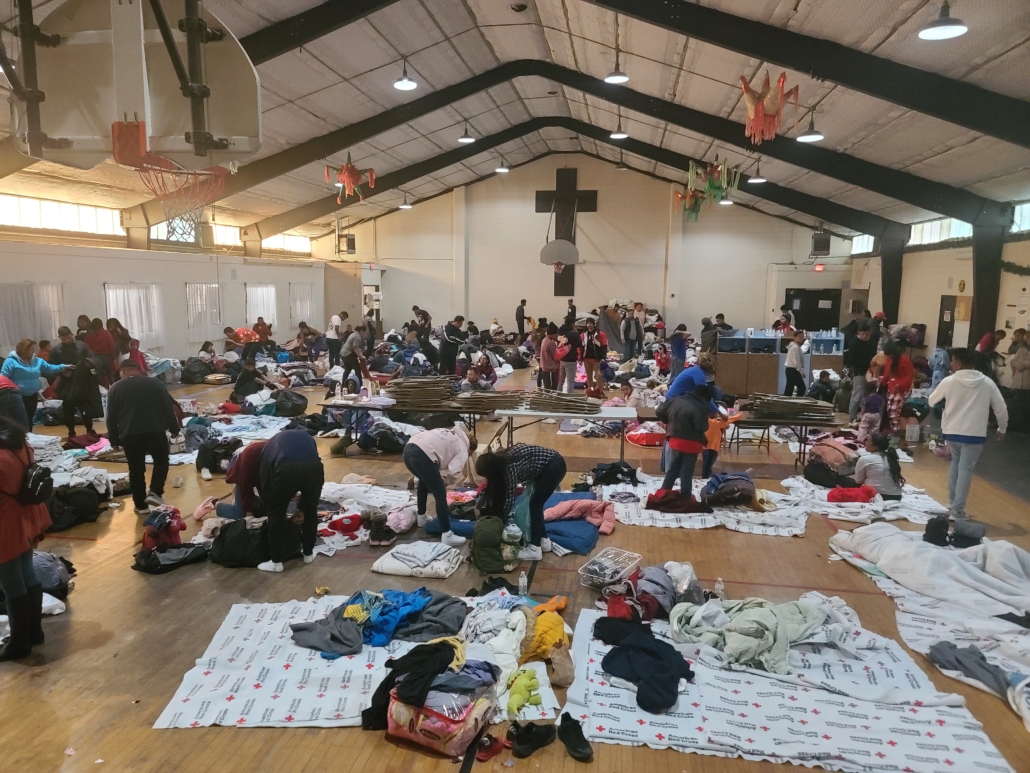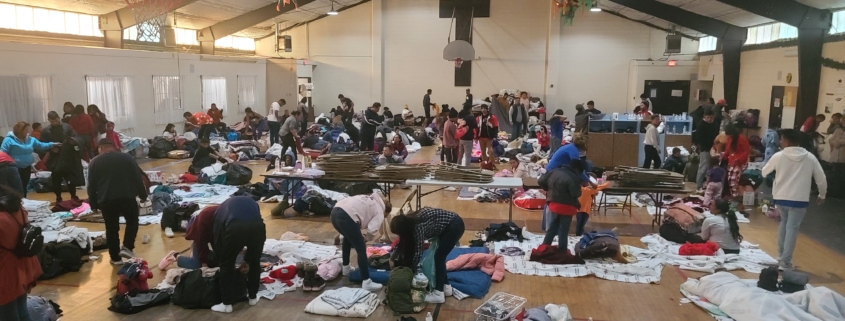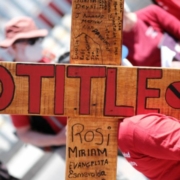Catholic Groups Oppose Title 42 Expansion by Biden Administration
BY ISN STAFF | January 6, 2023
Earlier this week, the Biden Administration announced plans to expand the asylum-blocking Title 42. The new plan effectively expands the scope of migrants and asylum seekers who can be immediately expelled under Title 42. It also expands a previously implemented program of virtual applications for parole into the U.S. for Venezuelan migrants to include Haitian, Cuban, and Nicaraguan migrants. This approach will require migrants to have U.S.-based financial sponsors, limit the number of total migrants entering the country, bar people who have been expelled from being able to apply for humanitarian parole and keep people in the countries from which they are trying to seek asylum from.

Recently arrived migrants at Casa del Sagrado Corazon, near Sacred Heart Jesuit Parish in El Paso, Texas, December of 2022.
The policy, which began in March of 2020 as a Trump-era response to the Covid-19 pandemic, has been held up in the federal courts after an anticipated end date of December 2022. The Supreme Court is expected to hear verbal argument in February of this year regarding Title 42.
Faith communities across the nation have remained steadfast in their faith-rooted commitment to welcoming and extending hospitality to those in need. They continue to call on the Biden administration to accept the ruling and use this important moment to rebuild the U.S. asylum system to welcome people fleeing persecution with dignity. In November, Catholic groups urged for an end to Title 42 and restoration of asylum for those seeking it at the U.S.-Mexico border in the wake of a lower court’s action to end Title 42, which was overruled by the Supreme Court’s decisions in December of last year.
Jorge Palacios Jr, ISN’s migration coordinator for youth engagement, said, “When judge Emmet Sullivan ruled in November of last year that Title 42 was ‘arbitrary and capricious,’ his sentiment echoed that of asylum seekers, activists, doctors, and those who work with people that have been expelled or denied entry at the U.S.-Mexico border. The Biden administration’s recent actions regarding Title 42 and the new process for asylum requests will keep people in dangerous situations and force more people to make difficult, often unsafe decisions for their livelihoods. We are called to welcome the stranger in our midst, to make them feel as a native-born among us (Leviticus 19:34), and to love them as ourselves (Mark 12:31). Catholic Social Teaching calls us to embrace the dignity of the human person who is at the margins, as well as upholds that human beings have the right to migrate for reasons of safety. In expanding who can be expelled by Title 42, we are choosing to close our eyes to the experience of those on the margins, ignoring our mandate to welcome, protect, promote, and integrate the stranger in our midst.”
“Amidst relentless news on policies that limit access to protection at the border, yesterday’s announcement hits particularly close to home,” said Joanna Williams, Executive Director of the Kino Border Initiative, “I have friends and colleagues in Nicaragua who are being persecuted because of their affiliation to the Catholic Church and Jesuit institutions. I have sat and cried with Haitians who are afraid that their family members will be murdered. Yesterday’s announcement isn’t abstract, it means that people who I love who are in danger will have fewer options for safety.”
“It simply defies reason and lived realities to require those facing persecution, trafficking, and torture to only pursue protection from within those potentially life-threatening situations,” said Bishop Mark J. Seitz of El Paso, chairman of the USCCB’s Committee on Migration. “This is a drastic departure from the Administration’s promise to create a ‘fair, orderly, and humane’ immigration system and will only exacerbate challenges on both sides of our border. Even for those who are permitted to enter the United States, we continue to be concerned about their access to housing, work authorization, legal services, and other pressing needs.”
“Humanitarian parole is intended for use in emergencies when no other opportunity for protection is available,” said Giulia McPherson, Director of Advocacy for JRS/USA. “As we’ve seen with our brothers and sisters from Afghanistan who were evacuated to the US in August 2021, parole does not offer a permanent solution. Instead, parolees live in limbo as they wait for policymakers to establish a permanent path to legal status. We do not want Ukrainians, Venezuelans, and now Nicaraguans, Cubans, and Haitians to face this same predicament.”









Faith can move mountains.